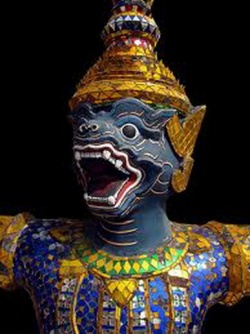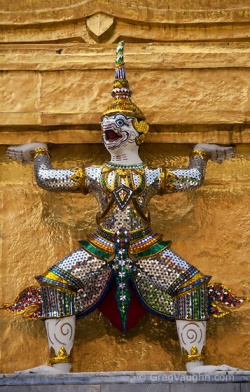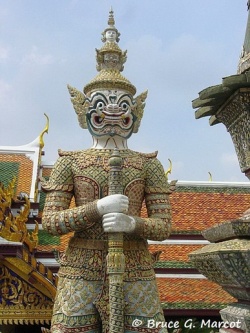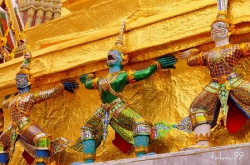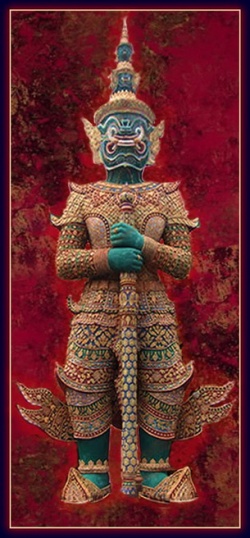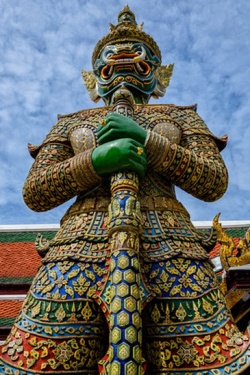Yaksha
Yaksha (Sanskrit: यक्ष; yakṣa) is the name of a broad class of nature-spirits, usually benevolent, who are caretakers of the natural treasures hidden in the Earth and tree roots.
They appear in Hindu, Jain and Buddhist literature.
The feminine Form of the word is yakṣī (यक्षी) or Yakshini (yakṣiṇī, यक्षिणी).
In Hindu, Jain, and Buddhist texts, the yakṣa has a dual personality. On the one hand, a yakṣa may be an inoffensive nature-fairy, associated with woods and mountains;
but there is also a darker version of the yakṣa, which is a kind of Ghost (bhuta) that haunts the wilderness and waylays and devours travelers, similar to the rakṣasas.
In Kālidāsa's poem Meghadūta, for instance, the yakṣa narrator is a romantic figure, pining with Love for his missing beloved.
By contrast, in the didactic Hindu dialogue of the Yakṣapraśnāḥ "Questions of the Yakṣa", it is a tutelary spirit of a lake that challenges Yudhiṣṭhira.
The yakṣas may have originally been the tutelary Gods of forests and villages, and were later viewed as the steward deities of the Earth and the Wealth buried beneath.
In Indian Art, male yakṣas are portrayed either as fearsome warriors or as portly, stout and dwarf-like.
Female yakṣas, known as yakṣiṇīs, are portrayed as beautiful young women with happy round faces and full breasts and hips.
Yakṣas in Buddhism
In Buddhist literature, the yakṣa are the attendants of Vaiśravaṇa, the Guardian of the Northern Quarter, a beneficent God who protects the righteous.
The term also refers to the Twelve Heavenly Generals who guard Bhaiṣajyaguru, the Medicine Buddha.
According to the Mahavamsa, Prince Vijaya encountered the royalty of the Yakkhas.
King Maha Kalasena, Queen Gonda on the celebration of the marriage of their daughter Princess Polamitta in the Yakkha capital of Lankapura and conquered them. Lankapura may have been in Arithra or Vijithapura.
The Yakkhas served as loyal subjects with the Vijiyan dynasty and the Yakkha chieftain sat on equal height to the Sri Lankan leaders on festival days.
Thailand
Yakshas (Thai: ยักษ์, Yak) are an important element in Thai temple Art and architecture.
They are common as guardians of the gates in Buddhist temples throughout The country since at least the 14th century.
Ceramic sculptures of guardian Yakshas were produced in Thailand, during the Sukhothai and Ayutthaya periods, between the 14th and 16th centuries, at several kiln complexes located in northern Thailand.
They are mostly depicted with a characteristic face, having big round bulging Eyes and protruding fangs, as well as a green complexion.
Yakshas and their female counterparts are common in the Buddhist literature of Thailand.
As ogres, giants and ogresses yakshas are popular as well in Thai folklore.
"ย ยักษ์", (yo yak) is also used as an illustration in order to name the letter ย, the 34th consonant of the Thai alphabet, according to the traditional letter symbols Thai children use to memorize the alphabet.
Yaksha and Yakshini in Jainism
Jains mainly worship idols of Arihants and Tirthankaras, who have conquered the inner passions and attained God-Consciousness status.
Some Jains also believe that Yaksha and Yakshini look after the well-being of Tirthankaras.
Usually, they are found in pair around the idols of Jinas as male (yaksha) and female (yakshini) guardian deities.
Yaksha is generally on the right-hand side of the Jina idol and Yakshini on the left-hand side.
In earlier periods, they were regarded mainly as devotees of Jina, and have supernatural powers.
They are also wandering through the cycles of births and deaths just like the worldly souls, but have supernatural powers.
Over time, people started worshiping these deities as well.
Some sections of Jains looked at yaksas and yaksanis for the immediate returns, and gave them the places in their temples.
Some Yaksa were and are known for bestowing fertility and Wealth upon their devotes.
Therefore, they had become very popular and their idols had been placed in Jain temples and Jains worship them.
Jains offer them different things in favor of boons for children, Wealth or freedom from fears, illness or disease.
Jainism provides very clear foundations and guidelines, and it is up to every individual jains to decide which idols to worship and which ones that should just be acknowledged.
Sthanakvasi and Terapanthi Jains of the Svetambara and Taranpanthi Jains of the Digambaras do not believe in idol worshiping.
Source
One of the eight kinds of nonhuman beings mentioned in Buddhist literature.
In Hindu mythology, yakshas were benevolent spirits and followers of Kubera, the god of wealth, who is also referred to as Vaishravana.
Buddhism later included them as one of the eight kinds of nonhuman beings who work to protect Buddhism.
Yakshas are regarded as followers of the heavenly king Vaishravana who is said to dwell halfway up the northern slope of Mount Sumeru, and also as guardians of the northern quarter.
In some sutras, however, they are depicted as ugly, fierce demons that torment or harm human beings.
See also; Vaishravana.
Source
Yaksha (Skt. yakṣa; Tib. གནོད་སྤྱིན་, nöjin; Wyl. gnod sbyin) — one of the eight classes of gods and demons.
Source
One of a special class of powerful "non human" beings - sometimes kindly, sometimes murderous and cruel - corresponding roughly to the fairies and ogres of Western fairy tales. The female (yakkhini) is generally considered more treacherous than the male.
The demons in the lower realm, like the Ghost Realm. They are evil, malignant and violent. They live on earth or in air.
A class of non human beings generally described as amanussa. They are mentioned with Devas, Rakkhasas, Danavas, Gandhabbas, Kinnaras, and Mahoragas (? Nagas) (E.g., J.v.420).
In other lists (E.g., PvA. 45, 55) they range immediately above the Petas; in fact, some of the happier Petas are called Yakkhas.
Elsewhere (E.g., A.ii.38) they rank, in progressive order, between manussa and gandhabba.
They are of many different kinds: spirits, ogres, dryads, ghosts, spooks. In the early records, yakkha, like naga, as an appellative, was anything but depreciative.
Thus not only is Sakka, king of the gods, so referred to (M.i.252; J.iv.4; DA.i.264), but even the Buddha is spoken of as a yakkha in poetic diction (M.i.386).
Many gods, such as Kakudha, are so addressed (S.i.54).
According to a passage in the Vimanavatthu Commentary, (VvA.333) which gives illustrations, the term is used for Sakka, the Four Regent Gods (Maharajano), the followers of Vessavana, and also for puriso (individual soul?).
In the scholiast to the Jayadissa Jataka (J.v.33), the figure of the hare in the moon is also called yakkha.
Of these above named, the followers of Vessavana appear to be the Yakkhas proper.
The term yakkha as applied to purisa is evidently used in an exceptionally philosophical sense as meaning soul in such passages as ettavata yakkhassa suddhi (SN.vs.478), or ettavat aggam no vadanti h eka, yakkhassa suddhim idha panditase (SN.vs.875).
In the Niddesa (MNid.282), yakkha is explained by satta, nara, manava, posa, puggala, jiva, jagu, jantu, indagu, manuja.
The last term is significant as showing that yakkha also means man.
The cult of yakkhas seems to have arisen primarily from the woods and secondarily from the legends of sea faring merchants.
To the latter origin belong the stories connected with vimanas found in or near the sea or in lakes.
The worship of trees and the spirits inhabiting them is one of the most primitive forms of religion.
Some, at least, of the yakkhas are called rukkha devata (E.g., J.iii.309, 345; Pv.i.9; PvA.5) (spirits of trees), and others bhummadevata, (PvA.45,55) (spirits of the earth), who, too, seem to have resided in trees.
Generally speaking, the Yakkhas were decadent divinities, beings half deified, having a devas supernormal powers, particularly as regards influencing people, partly helpful, partly harmful.
They are sometimes called devata (E.g., S.i.205), or devaputta (E.g., PvA. 113, 139).
Some of these, like Indakuta and Suciloma, are capable of intelligent questioning on metaphysics and ethics.
All of them possess supernatural powers; they can transfer themselves at will, to any place, with their abodes, and work miracles, such as assuming any shape at will.
An epithet frequently applied is mahiddhika (E.g., Pv.ii.9; J.vi.118).
Demon, gender: male. For female, see Yakkhi.
in popular belief, a kind of ghost, goblin or ogre. See Yakkha.
The Yakkhas (or Yakshas) though hardly demons (as their name is often rendered) are mostly ill disposed to the human race, sometimes man-eaters and often of unedifying conduct.
The Mahâsamaya-sutta also mentions mountain spirits from the Himalaya, Satagiri, and Mount Vepulla.
Yakshas are sometimes considered to be a class of the Gandharvas, but are definitely of a more malevolent disposition.
They are the sons of the sage Kashyapa and Khasa.
In many stories, they harrass mortals, chiefly by enchanting forests, lakes and rivers and killing any human who ventures near them.
They are more closely related to the Asuras because of their dark deeds.
They are not immortal, and definitely not worshiped.
They are mostly the enemies of mankind.
They are very long lived and possess magical powers, although they can be defeated by men without magic.
The Yakshas are said to be very wealthy.
Their king Kubera is said to be the wealthiest of all beings.
Yaksha is the name of a broad class of nature-spirits, usually benevolent, who are caretakers of the natural treasures hidden in the earth and tree roots.
They appear in Hindu, Jain and Buddhist mythology.
In Hindu, Jain, and Buddhist mythology, the yakṣa has a dual personality.
On the one hand, a yakṣa may be an inoffensive nature-fairy, associated with woods and mountains;
but there is also a darker version of the yakṣa, which is a kind of ghost (bhuta) that haunts the wilderness and waylays and devours travelers, similar to the rakṣasas.
Yaksha; (Sanskrit: यक्ष yakṣa, Pali: यक्ख yakkha, Tamil: யக்கர், Kannada: ಯಕ್ಷ, Yākka, Thai: ยักษ์ yaksa, Chinese: 夜叉 yèchā or 藥叉 yàochā, Korean: 야차/夜叉 yacha, Japanese: 夜叉 yasha, Tibetan: གནོད་སྦྱིན་ gnod sbyin)
The feminine form of the word is yakṣī (यक्षी) or Yakshini (yakṣiṇī (यक्षिणी), Pāli: yakkhī (यक्खी) or yakkhiṇī (यक्खिणी)).
Yakṣa (यक्ष): Yaksha or Yakkha (Pāli) is the name of a broad class of nature-spirits or minor deities who appear in Hindu and Buddhist mythology.
The feminine form of the word is yakṣī or yakṣiṇī (Pāli: yakkhī or yakkhinī). subjects of Kubera, the god of wealth.
In Buddhist literature, the yakṣa are the attendants of Vaiśravaṇa, the Guardian of the Northern Quarter, a beneficent god who protects the righteous.
The term also refers to the Twelve Heavenly Generals who guard Bhaiṣajyaguru, the Medicine Buddha.
According to the Mahavamsa, Prince Vijaya encountered the royalty of the Yakkhas.
King Maha Kalasena, Queen Gonda on the celebration of the marriage of their daughter Princess Polamitta in the Yakkha capital of Lankapura and conquered them. Lankapura may have been in Arithra or Vijithapura.
The Yakkhas served as loyal subjects with the Vijiyan dynasty and the Yakkha chieftain sat on equal height to the Sri Lankan leaders on festival days.
If there are yakshas. "Yakshas" is a Sanskrit word which means "speedy" (jie yi). It also means "courageous and strong" (yong jian).
There are three main types of ghost:
